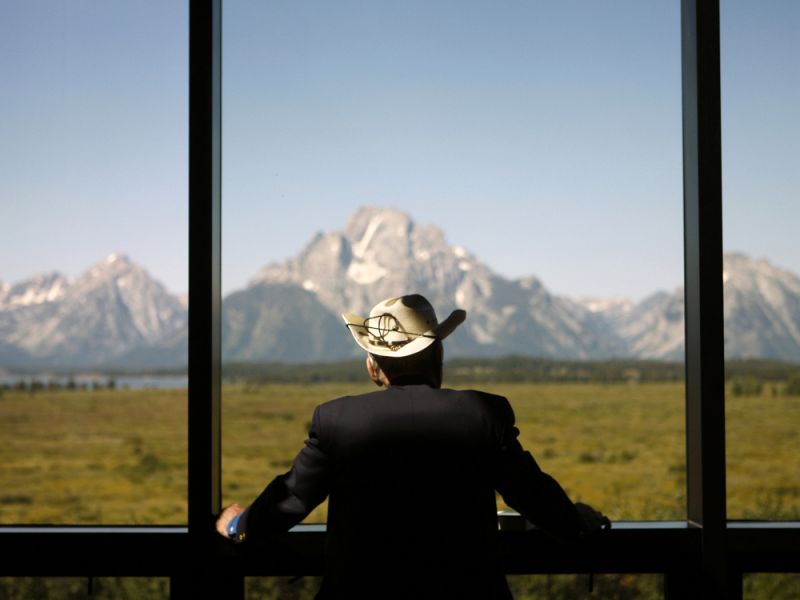

(Bloomberg) — Central bankers from around the world are gathering in Jackson Hole, Wyoming, for the Kansas City Federal Reserve’s annual retreat.
This year’s meeting occurs against a backdrop of volatile financial markets, rising fears of recession and global trade tensions. On Friday, the trade war between the world’s biggest economies escalated further as China announced that it would levy retaliatory tariffs on another $75 billion of U.S. goods. President Donald Trump quickly tweeted that he’ll respond later in the day.
Markets gyrated as the U.S.-China news unfolded and as comments emerged from Jackson Hole, headlined by Federal Reserve Chairman Jerome Powell who said the U.S. economy was in a favorable place but faced “significant risks.”
Here’s a running summary of news and commentary from the gathering.
Fed’s Clarida: 4:25 p.m.
Federal Reserve Vice Chairman Richard Clarida says the U.S. economy is in a good place, but the global outlook has worsened and policy makers will take that into account when they meet next month.
“We adjusted policy at our July meeting. We take our policy decisions one meeting at a time,” he tells CNBC in an interview at Jackson Hole. “But as we’ve indicated, we will do what we need to, to put in place the appropriate policies and we’ll act as appropriate to keep the economy in a good place.”
“We run monetary policy for the U.S., but we have to take into account global developments,” he said. “They impact exports, they impact inflation, and we are going to factor that in.”
BOE’s Carney: 3 p.m.
A collapse of Brexit talks resulting in the U.K. leaving the European Union without a transition agreement would likely prompt the Bank of England to loosen monetary policy, Governor Mark Carney said in a speech at the symposium.
Carney, who is a few months away from stepping down as BOE governor, also laid out a proposal for an overhaul of the global financial system that would eventually replace the dollar as a reserve currency with some form of global digital currency — similar to Facebook Inc.’s proposed Libra.
Read more about Carney’s remarks here.
Choose a Rule: 12:55 p.m.
Former Federal Reserve Economist and European Central Bank policy maker Athanasios Orphanides renewed the argument for central bankers to set interest rates by following a formulaic policy rule.
“Monetary policy is most effective when it is formulated in a systematic manner, following a clearly communicated monetary policy rule,” Orphanides wrote in the third paper presented Friday at Jackson Hole.
A long-time proponent of policy formulas, Orphanides argued that choosing a simple rule as a benchmark would help the Fed communicate its reasons for interest-rate movements and shield it from the perception that it was influenced by political pressure. That’s a timely point as the Fed has been under relentless pressure from Trump to slash rates.
Orphanides, who is now an economics professor at MIT, recommended a so-called first-difference rule, which would adjust the benchmark interest rate according to changes in near-term projections for inflation and growth. He and New York Fed President John Williams co-authored a paper on the concept in 2002.
World’s Central Bank: 11:55 a.m.
Powell and his colleagues don’t want the Fed to be viewed as the world’s central bank, but their monetary policy has huge ripple effects on economies in Europe and Asia, according to the second paper presented Friday at Jackson Hole.
University of Maryland economist Sebnem Kalemli-Ozcan, in a review of policy implications, found that Fed interest rate changes have “large spillover effects” on emerging markets, affecting capital flows, domestic borrowing and exchange rates.
Developing countries can mitigate the impact of U.S. rate change in part by having a flexible exchange rate and by strengthening institutions to reduce corruption and ensure the rule of law, the economist wrote in the paper “U.S. Monetary Policy and International Risk Spillovers.”
Riders on the Storm: 10:30 a.m.
Central bankers are like “riders on the storm,” their policies buffeted by global forces beyond their control. That was the argument made in a paper by that name which was the first presented Friday at Jackson Hole.
In it, economists Oscar Jorda of the San Francisco Fed and Alan Taylor of the University of California, Davis argue that central banks that ignore global interest rate trends risk generating imbalances and credit dislocations in their own economies.
The research has some relevance for Fed officials today, as they struggle over what policy changes, if any, to make in response to weakening economies and falling interest rates overseas, and a rising dollar.
Much of the paper deals with the so-called neutral interest rate that neither spurs nor restricts a nation’s economy.
Powell Speaks: 10 a.m.
Fed Chairman Jerome Powell says the U.S. economy is in a favorable place but faces “significant risks” as growth abroad slows amid trade uncertainty, keeping another rate cut on the table when officials meet next month.
“We will act as appropriate to sustain the expansion, with a strong labor market and inflation near its symmetric 2% objective,” Powell said in the text of his remarks to the conference.
“We have seen further evidence of a global slowdown, notably in Germany and China. Geopolitical events have been much in the news, including the growing possibility of a hard Brexit, rising tensions in Hong Kong, and the dissolution of the Italian government,” he said.
Fed’s Harker: 9:45 a.m.
Philadelphia Fed President Patrick Harker weighed in with the hawks in a Jackson Hole interview, saying lower rates wouldn’t boost the economy when the concern is a trade war.
“Right now, we are where we need to be,” Harker told Bloomberg Television. “There are clearly downside risks to the economy. We would have to act as appropriate if those look like they are coming to fruition.”
“If business investment is not being held back by the cost of capital, us reducing interest rates will have no effect,” he said. “What is holding you back is uncertainty around policy, particularly trade policy.”
Fed’s Mester: 9 a.m.
Federal Reserve Bank of Cleveland President Loretta Mester says she will probably favor keeping rates on hold when policy makers gather in September, but she has an “open mind” about the argument for further cuts.
“At this point, if the economy continues where it is, I would probably say we should keep things where they are, but I am very attuned to the downside risks of the economy,” Mester said in interview Friday with CNBC television.
Mester isn’t a voter on the Federal Open Market Committee this year. Several of the Fed’s policy makers have voiced their resistance this week to the notion that the U.S. economy needs lower interest rates.
The Cleveland official told Bloomberg’s Michael McKee Friday that China’s latest plan to impose additional tariffs against the U.S. just adds to the uncertainty surrounding businesses’ plans.
“If we were ever data-dependent before, we have to be uber-data dependent now,” she said.
As Mester spoke from Jackson Hole, U.S. President Donald Trump resumed his tweets pressuring the Fed. He’s repeatedly called for the central bank to slash rates more aggressively.
Fed’s Kaplan: 8:40 a.m.
Dallas Fed President Robert Kaplan, who is not an FOMC voter this year, also sounded hesitant about cutting at the next Fed meeting, set for Sept. 17-18.
“Even though I am open to an adjustment either in September or the next few meetings, I prefer not to have to make an adjustment,” he said in an interview with Bloomberg Television Friday, because it encourages risk taking.
“The fulcrum or center of gravity of U.S. economic today policy is not monetary policy. It is trade uncertainty, it is probably immigration policy to some extent, it is policies that relate to improved skills training, infrastructure spending,” he said. “That is the center of gravity.”
Fed’s Bullard: 8 a.m.
Federal Reserve Bank of St. Louis President James Bullard said Friday that the central bank needs to take out additional “insurance” in lowering interest rates, and hinted he might be willing to support a cut larger than a quarter point.
“I think there will be a robust debate about 50, so I think it’s creeping on to the table here, but obviously the markets have a base case of 25 basis points,” Bullard said in a Bloomberg TV interview with Michael McKee from Jackson Hole.
Bullard said the Fed needs to be cushioning against the impact of a global manufacturing slowdown and U.S. trade war with China. He compared the situation to the mid-1990s, when a Fed led by Alan Greenspan reduced rates 75 basis points to keep the expansion going.
“That’s what they did in the 1990s, I don’t know where we will end up,” Bullard said.
Insurance Cut: 7:30 a.m.
“How much risk are we facing from the fact that we’ve got a global manufacturing contraction going on?,” Bullard asked in an earlier interview Friday with CNBC television. “There is some downside risk, and I would like to take out more insurance against the downside risks.”
One of the most dovish members of the Federal Open Market committee, Bullard said low inflation and the unusual dynamic in the U.S. Treasuries market also provide policy makers justifications to cut.
“The yield curve has inverted,” he said, referring to the fact that yields on longer-dated debt have fallen below yields on short-term securities. He also noted that the federal funds rate is high relative to Treasury yields. “We have one of the higher rates on the yield curve. That is not a good place to be.”
–With assistance from Vince Golle, Michael McKee, Christopher Condon, Steve Matthews and Brian Swint.
To contact the reporters on this story: Rich Miller in Jackson Hole at [email protected];Craig Torres in Washington at [email protected]
To contact the editors responsible for this story: Margaret Collins at [email protected], Alister Bull
<p class="canvas-atom canvas-text Mb(1.0em) Mb(0)–sm Mt(0.8em)–sm" type="text" content="For more articles like this, please visit us at bloomberg.com” data-reactid=”83″>For more articles like this, please visit us at bloomberg.com
©2019 Bloomberg L.P.










